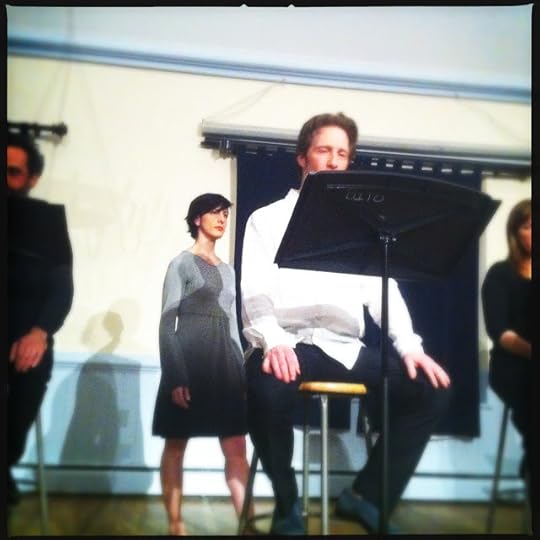Orphic and Orchid

On Saturday, February 25th, 2012, I accompanied my friend Anne Gorrick to a staged reading of Robert Kelly's verse play, "Monologues for Orpheus." Our friend Lynne Behrendt performed in it as part of the chorus, a chorus that didn't speak in unison, but in conversation and in conflict with each other. It ended up being a surprisingly enjoyable evening.
After a few sonorous remarks from Robert Kelly, giving both the modern and ancient Greek forms of one word and explaining that "carmen" means "poem" in Latin (hey, I'm a visual poet, so how could I be one without knowing what a carmen figuratum is?), the evening moved into bassoon.
The bassoon, despite its perjorative nickname (the clown of the orchestra), is a beautiful instrument, both visually and aurally. It has a richness and depth that reminds me of a dark yet smooth Chinese black tea, like the Panyang I had on Sunday afternoon after this performance. The bassoonist, David Adam Nagy, did a great job, not quite perfect, but a performance good enough to wake me to the promise of the day in the evening of it. And he moved, almost like a rock musician (or Pan playing the flute) through his performances of Johann Sebastian Bach's "Allemande" from the "Partita for Solo Flute in A Minor" and of Elisha Adrienne's quite wonderful "Hellenistic Songs," with the tenor voice of Péter Laki thrown in.
After this extravagantly beautiful opening, in the small chapel that is Bard Hall on the campus of Bard College in Annandale-on-Hudson, New York, we moved into the reading.
The actors were arranged on chairs, with music stands before them to hold the scripts. Orpheus was dressed in a white shirt, the four members of the chorus were dressed all in black, and Eurydice, who also was "the director," wore a grey dress, and she didn't stay in place. Stood by a chair in the corner but moved into the realm of the other actors and danced, slowly, among them. She was the only actor who remained silent the entire time.
The staging itself was remarkable, given that it was a staged reading where only one actor, the dancer, did any moving on her feet. There was something reserved yet affecting about watching and listening to the actor's read their lines in situ, especially since each actor was so remarkably different from each other, so given over to a personality apparently chosen for him or her by Robert Kelly himself. Mikhail Horowitz was dramatic, talkative, expressive, and Lynn Behrendt was reserved, ironic, questioning.
The words themselves were sometimes goofy and obvious and sometimes verging on the sexist. And they were about writing, about the role of the poet in the world, about the responsibility of the poet, but also about the poet's arrogance. Orpheus was the poet, and he sat the most still of all the actors, secure in his beauty and stature, secure in the power and fertility of his orchids.
In the end, I still enjoyed the production. The script needs editing, and maybe I'm disturbed by a play so focused on the occupation of the poet, a play so Narcissistic in its focus. For us poets, there is something interesting in the metaphysical consideration of poetry and the act of the poet in the making of that poetry. But is there a concomitant interest in such in the general audience for such a play? Or is such a work of art intended only for practitioners of its creation?
I wondered, in the end, about the fragility of the poet's status in the real world, the one of flesh and blood and Mammon. I wondered about the conversations we conduct about our art but among ourselves alone. I wondered if we were nothing but Narcissus and Echo ourselves. If we were nothing but automythologists. If we were doomed to watch and listen only to ourselves forever.
But listen:
ecr. l'inf.
Published on February 28, 2012 20:11
No comments have been added yet.



